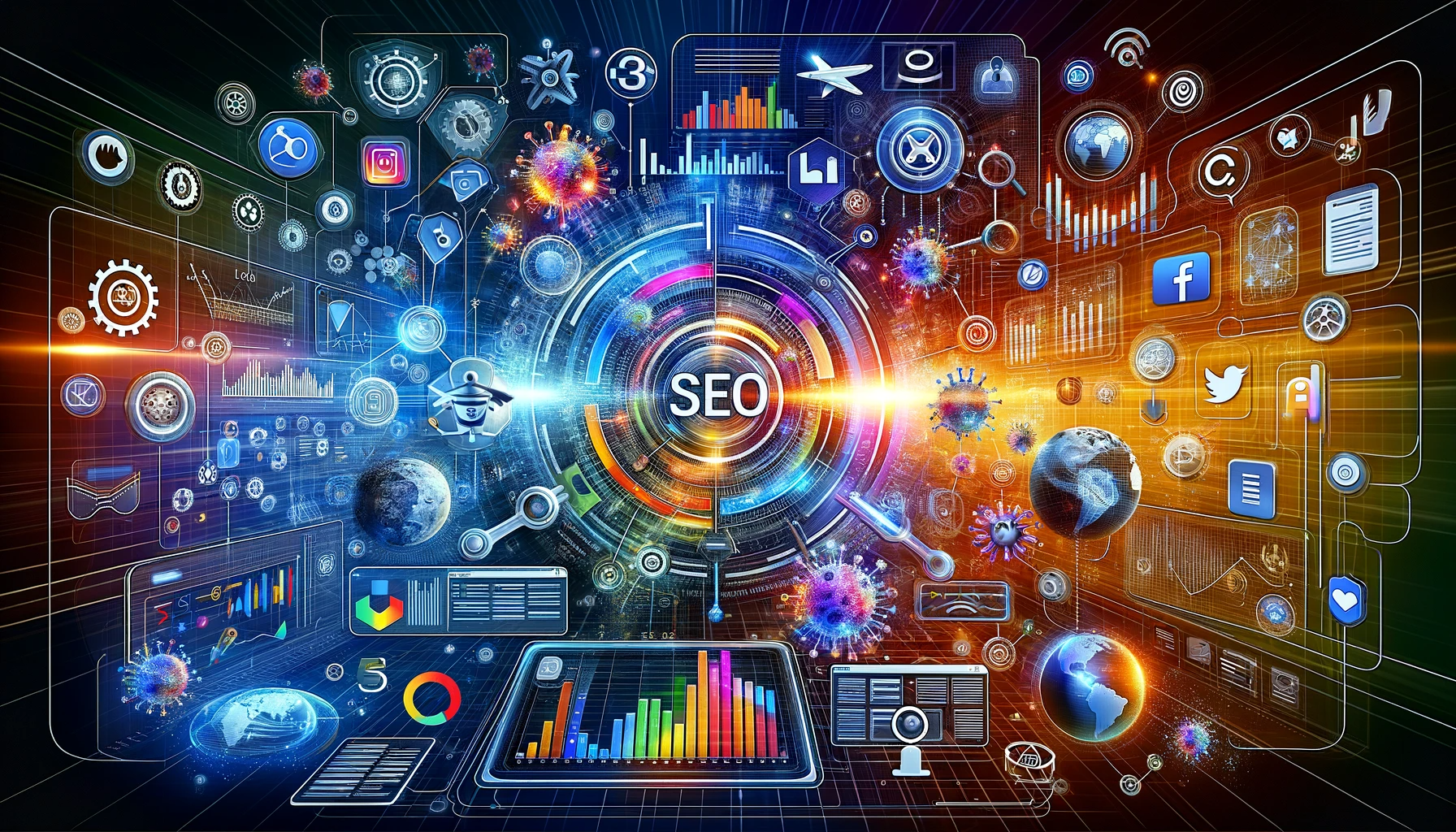
The world of search engine optimization (SEO) is rapidly evolving, and artificial intelligence (AI) is playing an increasingly significant role in shaping its future. As AI technology advances, it is transforming the way we approach SEO, offering new opportunities and challenges for businesses and marketers alike. Embracing AI-powered solutions can provide a competitive edge and ensure long-term success in the ever-evolving digital landscape.
- Introduction to AI for SEO
- Understanding How AI Impacts SEO
- AI-Powered Keyword Research Strategies
- Leveraging AI for Content Optimization
- Utilizing AI for Link Building and Outreach
- AI-Driven Analytics and Performance Tracking
- Implementing AI Chatbots for Enhanced User Engagement
- The Role of AI in Voice Search Optimization
- Preparing Your SEO Strategy for an AI-Centric Future
- Frequently Asked Questions about AI and SEO
Introduction to AI for SEO
Artificial intelligence (AI) is rapidly transforming the landscape of search engine optimization (SEO). As search engines become more sophisticated, they are increasingly relying on AI algorithms to understand user intent, analyze content, and deliver the most relevant results. This shift towards AI-driven search has significant implications for businesses and marketers seeking to optimize their online presence.
AI in SEO encompasses a wide range of applications, from natural language processing (NLP) and machine learning (ML) to deep learning and neural networks. These technologies are being leveraged to enhance various aspects of SEO, including keyword research, content optimization, link building, and user engagement. By harnessing the power of AI, businesses can gain a competitive advantage and stay ahead of the curve in the ever-changing world of search engine optimization.
Understanding How AI Impacts SEO
AI is revolutionizing the way search engines process and understand information. Traditional SEO techniques that relied on keyword stuffing and manipulative tactics are becoming increasingly ineffective as search engines adopt AI-powered algorithms that prioritize high-quality, relevant, and user-friendly content.
One of the primary ways AI impacts SEO is through its ability to understand natural language and user intent. AI algorithms can analyze search queries, identify the underlying context and meaning, and deliver results that align with the user’s needs. This shift towards semantic search has profound implications for content creation and optimization strategies.
Example: Google’s RankBrain, an AI-powered component of its ranking algorithm, uses machine learning to understand the context and intent behind search queries, enabling it to deliver more relevant results, even for queries it has never encountered before.
By embracing AI-driven approaches, businesses can create content that resonates with their target audience, improve the user experience, and ultimately enhance their search engine visibility. However, it’s crucial to stay up-to-date with the latest AI developments and adapt strategies accordingly to remain competitive in the ever-changing SEO landscape.
AI-Powered Keyword Research Strategies

Keyword research is a crucial component of any successful SEO strategy, and AI is transforming the way businesses approach this process. AI-powered tools that can provide more accurate and insightful data are replacing traditional keyword research techniques that relied on manual analysis and guesswork.
**AI algorithms can analyze vast amounts of data, including search trends, user behavior, and competitor strategies, to identify the most relevant and profitable keywords for a business.** Additionally, AI can help find long-tail keywords and semantic variations that conventional methods might have missed, offering a more thorough and focused approach to keyword research.
Examples of AI-powered keyword research tools:
- Aysa.ai – Automated Keyword Research
- Semrush Keyword Magic Tool
- Ahrefs Keyword Explorer
- Google Ads Keyword Planner
By leveraging AI-powered keyword research tools, businesses can gain valuable insights into user behavior, identify untapped opportunities, and optimize their content and campaigns for maximum impact and visibility.
Leveraging AI for Content Optimization
Content is the cornerstone of any successful SEO strategy, and AI is revolutionizing the way businesses create, optimize, and distribute content. AI-powered tools can analyze existing content, identify areas for improvement, and provide recommendations for optimizing it for better search engine visibility and user engagement.
One of the key advantages of AI in content optimization is its ability to analyze and understand natural language. AI algorithms can identify patterns, sentiment, and context within content, enabling businesses to create more engaging and relevant material for their target audience.
By leveraging AI-powered content optimization tools, businesses can ensure their content aligns with user intent, incorporates relevant keywords, and provides a seamless user experience.
Examples of AI-powered content optimization tools:
Additionally, AI can assist in content distribution and promotion, analyzing user behavior and preferences to identify the most effective channels and strategies for reaching the target audience. By embracing AI-driven content optimization, businesses can create a competitive advantage and drive better engagement, conversions, and search engine rankings.
Utilizing AI for Link Building and Outreach
Link building is a critical component of any SEO strategy, as high-quality backlinks from authoritative sources can significantly improve a website’s search engine rankings. However, traditional link building methods, such as manual outreach and guest posting, can be time-consuming and inefficient.
AI is transforming the way businesses approach link building by automating various aspects of the process. AI-powered tools can identify relevant websites and influencers, analyze their content and audience, and generate personalized outreach messages, increasing the chances of successful link acquisition.
Examples of AI-powered link-building tools:
By leveraging AI for link building, businesses can streamline the process, save time and resources, and focus on building high-quality backlinks from reputable sources. Additionally, AI can help identify and prioritize the most valuable link opportunities, ensuring that efforts are directed towards the most impactful strategies.
AI-Driven Analytics and Performance Tracking
Measuring and analyzing the performance of an SEO campaign is crucial for making data-driven decisions and optimizing strategies. AI is revolutionizing the way businesses approach analytics and performance tracking by providing more accurate and insightful data analysis.
AI algorithms can process vast amounts of data from various sources, including website analytics, search engine rankings, and user behavior, to identify patterns and trends that may be difficult for humans to detect.
This enables businesses to make more informed decisions about their SEO strategies and allocate resources more effectively.
Examples of AI-powered analytics and performance tracking tools:
By leveraging AI-driven analytics and performance tracking, businesses can gain a deeper understanding of their audience, identify areas for improvement, and optimize their strategies accordingly. This data-driven approach can lead to better ROI, increased efficiency, and a competitive edge in the ever-evolving SEO landscape.
Implementing AI Chatbots for Enhanced User Engagement
User engagement is a critical factor in SEO, as search engines prioritize websites that provide a positive user experience. AI-powered chatbots are becoming increasingly popular as a means of enhancing user engagement and improving the overall website experience.
**AI chatbots can simulate human-like conversations, providing users with personalized assistance, answering their queries, and guiding them through the website or application.** By improving user engagement and reducing bounce rates, AI chatbots can indirectly contribute to better search engine rankings.
Examples of AI-powered chatbot platforms:
Implementing AI chatbots can not only enhance the user experience but also provide valuable insights into user behavior and preferences. By analyzing chatbot interactions, businesses can identify pain points, optimize content and navigation, and ultimately improve their overall SEO performance.
The Role of AI in Voice Search Optimization
Voice search is rapidly gaining popularity, with an increasing number of users relying on virtual assistants like Siri, Alexa, and Google Assistant to perform searches and access information. As voice search technology continues to evolve, AI is playing a crucial role in optimizing websites and content for this emerging channel.
**AI algorithms can analyze and understand natural language queries, enabling search engines to provide more accurate and relevant results for voice searches.** Additionally, AI can help businesses optimize their content for voice search by incorporating conversational language and long-tail keywords that mimic how users speak.
Examples of voice search optimization strategies:
- Optimizing for long-tail, conversational keywords
- Incorporating structured data and schema markup
- Focusing on featured snippets and position zero results
- Improving website speed and mobile-friendliness
By embracing AI-driven voice search optimization strategies, businesses can ensure their content is easily discoverable and accessible through voice-based searches, providing a seamless user experience and staying ahead of the curve in this rapidly growing segment of the search landscape.
Preparing Your SEO Strategy for an AI-Centric Future
As AI continues to shape the future of search engine optimization, it is essential for businesses and marketers to adapt their strategies accordingly. Embracing AI and incorporating it into your SEO efforts can provide a competitive edge and ensure long-term success in the ever-evolving digital landscape.
To prepare for an AI-centric future in SEO, businesses should focus on creating high-quality, user-friendly content that aligns with user intent and provides value. Additionally, they should leverage AI-powered tools and technologies to streamline processes, gain insights, and optimize their strategies for better search engine visibility and user engagement.
Key steps to prepare for an AI-centric SEO future:
- Invest in AI-powered tools and technologies
- Focus on creating high-quality, user-centric content
- Optimize for voice search and conversational queries
- Leverage structured data and schema markup
- Prioritize user experience and engagement
- Stay up-to-date with the latest AI developments and trends
By embracing an AI-centric approach to SEO, businesses can future-proof their strategies, stay ahead of the competition, and thrive in the rapidly evolving digital landscape. It’s crucial to remain agile, adaptable, and open to incorporating new AI-driven solutions as they emerge.
Frequently Asked Questions about AI and SEO
Q: How will AI impact the future of SEO?
A: AI will continue to play a significant role in shaping the future of SEO. Search engines will increasingly rely on AI algorithms to understand user intent, analyze content, and deliver the most relevant results. Businesses that embrace AI-powered solutions will have a competitive advantage in optimizing their online presence and staying ahead of the curve.
Q: Can AI completely replace human expertise in SEO?
A: While AI can automate and streamline many aspects of SEO, human expertise and creativity will remain crucial. AI should be viewed as a powerful tool to augment and enhance human efforts, rather than a complete replacement. A combination of AI-driven insights and human strategic thinking will be essential for successful SEO strategies.
Q: How can businesses ensure their content is optimized for AI-driven search engines?
A: To optimize content for AI-driven search engines, businesses should focus on creating high-quality, user-centric content that aligns with user intent and provides value. Additionally, they should leverage AI-powered tools for content optimization, incorporate structured data and schema markup, and optimize for voice search and conversational queries.
Q: What are the potential risks or challenges associated with AI in SEO?
A: While AI offers numerous benefits for SEO, there are potential risks and challenges to consider. These include the risk of over-reliance on AI-powered tools, the potential for biased or inaccurate data, and the need for ongoing adaptation as AI technologies evolve. Businesses should approach AI with caution, maintain human oversight, and prioritize ethical and responsible use of these technologies.
Q: How can businesses stay up-to-date with the latest AI developments in SEO?
A: To stay up-to-date with the latest AI developments in SEO, businesses should follow industry leaders, attend relevant conferences and webinars, and continuously educate themselves on emerging trends and technologies. Additionally, they should be open to experimenting with new AI-powered tools and solutions as they become available.
By embracing AI and staying informed about its impact on SEO, businesses can position themselves for long-term success in the ever-evolving digital landscape.

